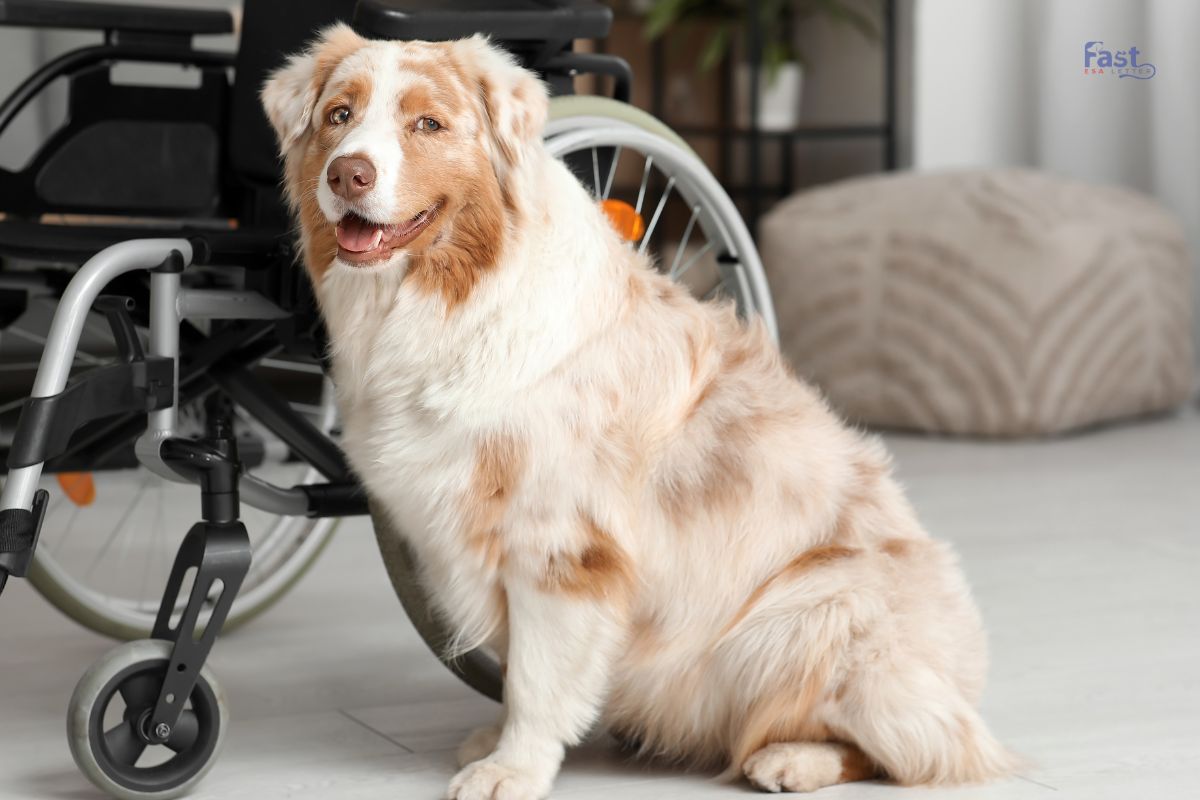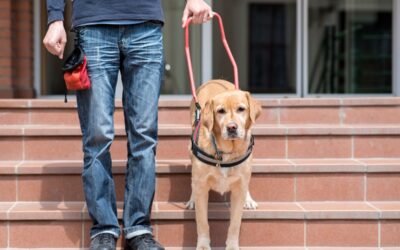How to Get a Psychiatric Service Dog in Minnesota

Key Requirements
- Get a Diagnosis: First, obtain a diagnosis of a qualifying mental health condition from a licensed mental health professional.
- Obtain a PSD Letter: You’ll need a letter from a mental health professional recommending a psychiatric service dog as part of your treatment plan.
- Find a Suitable Dog: Adopt or purchase a dog with the appropriate temperament and ability to be trained as a PSD. While Labrador Retrievers, Golden Retrievers, and Poodles are popular choices, any dog with the right temperament can be trained.
- Available Training methods: Your dog must be trained to perform specific tasks related to your disability, such as reminding you to take medication, grounding you during panic attacks, or providing physical support during moments of anxiety.
- Seek Professional Training if Needed: Professional service dog trainers or training organizations in Minnesota can help ensure your dog is effectively trained to perform the necessary tasks.
- PSD Laws in Minnesota: Under the Americans with Disabilities Act (ADA), you have the right to bring your PSD into public spaces, workplaces, and transportation.
- PSD Housing Laws in Minnesota: The Fair Housing Act grants you the right to live with your PSD, even in buildings with pet restrictions, as long as it assists with your disability.
- PSD Registration in Minnesota: You are not required to register or certify your dog in Minnesota.
What Is a Psychiatric Service Dog?
A psychiatric service dog is specifically trained to assist in managing mental health conditions like schizophrenia, bipolar disorder, or clinical anxiety. These dogs perform tasks that help you cope with daily challenges, enabling you to maintain routines and manage overwhelming situations. Whether it’s providing support during a panic attack or reminding you to take your medication, a PSD is there to assist you when needed.
What Are the Qualifications for a Psychiatric Service Dog in Minnesota?
Key Requirements
- Qualifying Medical Condition
To qualify, you must have a recognized mental health condition, such as anxiety, depression, PTSD, bipolar disorder, or another condition that significantly impacts your daily life. A mental health professional must diagnose these conditions and determine that a psychiatric service dog can help alleviate the effects of your disability by performing specific tasks. - Training Requirements
The PSD must be trained to carry out specific tasks directly related to your disability. These tasks may include:- Interrupting anxiety attacks
- Retrieving medications
- Providing deep pressure therapy
- Guiding you to safety
- Public Access Behavior
The PSD must be well-behaved and trained to follow commands in public settings. It should not display aggressive or disruptive behavior. - Disability Documentation
You’ll require a PSD letter to request housing accommodations, workplace assistance, or similar needs. This letter must confirm that you have a disability requiring the assistance of a psychiatric service dog.
How Can You Get a Psychiatric Service Dog in Minnesota?
1. Ensure Your Dog Is Trained
2. Consult with a Therapist
3. Discuss Your Need for a PSD
4. Request a PSD Letter
- Your diagnosis or disability
- How a PSD would assist in managing your condition
- Specific tasks the PSD would perform
How Do You Train Your Dog in Minnesota?
1. The DIY Adventure: Self-Training
Are you a hands-on learner who enjoys a challenge? Self-training your dog can be a rewarding experience. It allows you to bond deeply with your furry companion while tailoring the training to meet your needs. However, be prepared for a long and demanding journey.
Key considerations:
- Time Commitment: Training a psychiatric service dog in Minnesota can take six months or more.
- Knowledge and Skills: You’ll need a solid understanding of dog training principles and techniques.
- Consistency: Maintaining a consistent training routine is crucial for success.
2. Partnering with a Professional Trainer
Looking for a more streamlined approach? Working with a qualified dog trainer can significantly speed up the training process. Trainers bring expertise, experience, and specialized techniques, ensuring your dog receives the best possible training.
Benefits of working with a trainer:
- Efficiency: Trainers can often train your dog more quickly and effectively.
- Expertise: They have the knowledge to address specific challenges and behaviors.
- Public Behavior: Trainers can help ensure your dog behaves appropriately in public, meeting ADA requirements.
3. Adopting a Pre-Trained PSD
Need immediate assistance? Consider adopting a pre-trained PSD from a reputable organization. These dogs are already equipped to support individuals with disabilities.
Advantages of adopting a pre-trained PSD:
- Instant Support: You can start benefiting from your PSD’s assistance right away.
- Well-Trained: These dogs are already trained to perform specific tasks and behave properly in public.
What Are the Laws for Psychiatric Service Dogs in Minnesota?
1. Americans with Disabilities Act (ADA)
The Americans with Disabilities Act is the primary federal law governing service dogs, including psychiatric service dogs in Minnesota. However, Minnesota also has additional state laws and regulations that provide further protections.
Key ADA provisions for PSDs:
- Public Access: Businesses and public accommodations must allow individuals with disabilities, accompanied by trained service dogs, to access their facilities.
- No “Pet” Exception: Businesses cannot refuse entry to service dogs, regardless of general pet policies.
2. Minnesota Fair Housing Laws
According to the Fair Housing Act (FHA), individuals with mental health disabilities can live on any property of their choice, even in buildings with a “No Pet” policy. Landlords are prohibited from charging additional fees based on the dog’s breed, size, or weight.
However, if your dog is aggressive, disruptive, or damages the property, the landlord has the right to give you ten days’ notice to vacate the apartment.
3. Minnesota Human Rights Act
4. Air Carrier Access Act (ACAA)
The Air Carrier Access Act is a federal law that applies to all air carriers within the United States. It requires equal access for individuals with disabilities, including those with psychiatric service dogs.
Key ACAA provisions for PSDs:
- No “Pet” Exception: Air carriers must allow service dogs, regardless of their pet policies.
- No Certification Requirement: Airlines may ask for documentation of the dog’s training, but certification is not mandatory.
- In-Flight Care: Airlines must provide in-flight care for service animals, including food and water.
- No Additional Fees: Air carriers cannot charge extra fees for service animals.
What Are the Best Breeds for Psychiatric Service Dogs in Minnesota?
While there isn’t a one-size-fits-all answer, certain breeds have proven to be excellent psychiatric service dogs for individuals with mental health conditions.
Here are some top choices:
The Retrievers: Classic Choices
- Golden Retriever: Known for their gentle nature, intelligence, and affection for people, Golden Retrievers are a popular choice for psychiatric service dogs in MN. Their friendly demeanor and high trainability make them ideal companions.
- Labrador Retriever: Similar to Golden Retrievers, Labradors are intelligent and have a strong work ethic. Their playful yet gentle nature makes them an excellent option for PSD in Minnesota.
Gentle Giants: Large Breeds with a Heart
- German Shepherd: Renowned for their intelligence, loyalty, and protective instincts, German Shepherds are a popular breed for PSDs. Their ability to learn quickly makes them outstanding companions.
- Bernese Mountain Dog: These large, gentle dogs are known for their calm and patient temperament. Their loving nature and affinity for people make them great candidates for PSD work.
Tiny Titans: Small Breeds with Big Hearts
- Yorkshire Terrier: Despite their small size, Yorkshire Terriers are bold and can be trained to perform a variety of tasks. Their compact size makes them ideal for individuals who prefer a smaller PSD.
- French Bulldog: Known for their friendly and playful nature, French Bulldogs can be trained to provide comfort and emotional support to those with mental health conditions.
What Is the Cost of Getting a Psychiatric Service Dog in Minnesota?
If You Already Have a Dog
- Professional Training: If you already have a dog, hire a professional psychiatric service dog trainer in Minnesota. Trainers typically charge between $100 and $200 per session, with the total number of sessions depending on the complexity of the tasks your dog needs to learn.
- Self-Training: You can also choose to train your dog yourself. Self-training requires investing in resources such as books, online courses, or occasional professional guidance. Costs for self-training typically range from $500 to $2,000.
If You Don’t Have a Dog
- Adopting a Trained PSD: If you don’t currently have a dog, adopting a pre-trained psychiatric service dog can be a more immediate option. Prices for trained service dogs, particularly purebred dogs suited for service work, generally range from $1,000 to $4,000 or more.
Obtaining a PSD Letter
Is There a Government Department That Registers PSDs in Minnesota?
Can I Get My PSD Letter Online in Minnesota?
Does My Service Dog Need to Wear a Vest in Minnesota?
While some organizations recommend using a vest to clearly identify your dog as a service animal, it is not a legal requirement under the Americans with Disabilities Act or Minnesota state law.
So, why consider a vest for your service dog?
- Clear Identification: A vest helps others easily recognize your dog as a service animal, which can reduce unwanted attention or interruptions.
- Professional Appearance: A well-fitted vest gives your dog a more professional look, reinforcing its role as a working service animal.
What Can Psychiatric Service Dogs Be Trained to Do?
Psychiatric service dogs are specially trained to help individuals manage mental or emotional health conditions and improve their daily functioning. Some of the key tasks PSDs can perform include:
- Medication Reminders: Alerting you when it’s time to take medication, helping you stay on track with your treatment.
- Providing Physical Stability: Offering support when you feel dizzy, faint, or overwhelmed, helping to prevent falls or injuries.
- Monitoring Surroundings: Offering reassurance by checking the environment, especially helpful for individuals with conditions like schizophrenia, to reduce feelings of paranoia.
- Emotional Grounding: Providing comfort through physical touch during moments of anxiety or distress, helping you stay calm and focused.
- Promoting Social Interaction: Assisting with social anxiety by encouraging interaction with others and helping to reduce feelings of isolation.
- Disrupting Nightmares: Gently waking you from distressing nightmares, a key benefit for individuals with PTSD.
Bottom Line
Frequently Asked Questions (FAQs)
Can Psychiatric Service Dogs Be Any Breed in Minnesota?
How Do I Find a Qualified Mental Health Professional to Diagnose My Disability?
What Should I Do If Someone Challenges My Right to Have a PSD?
How Do I Find a PSD Trainer in Minnesota?
Do I Have to Disclose My Mental Health Condition to Have a PSD?
Post Author
Prince Sharma
Related Articles
Man With Schizophrenia Manages Symptoms With The Help Of A Psychiatric Service Dog
How PSD Helps Manage Symptoms of Schizophrenia?A Psychiatric Service Dog helps manage schizophrenia symptoms by providing emotional support, grounding the individual during hallucinations, and assisting in crisis situations. PSDs offer stability...
Why Do You Need a Psychiatric Service Dog ID Card?
Why Do You Need a Psychiatric Service Dog ID Card?A psychiatrist service dog ID card is not required by the ADA, but it can be helpful in communicating to others that your dog is a trained service animal. A PSD Letter makes it possible.In...
Anxiety and Psychiatric Service Dogs: What You Need To Know.
How Psychiatric Service Dogs Help Manage Anxiety: A Complete GuidePsychiatric service dogs help manage anxiety by providing emotional support and performing specific tasks tailored to their handler's needs. They can detect early signs of anxiety,...
Live and Fly Free with Your PSD!






